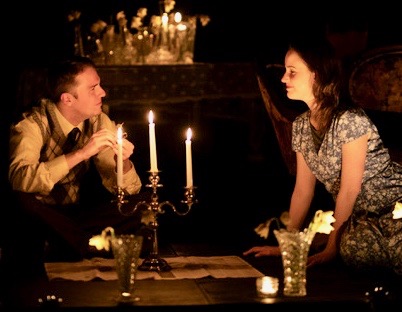By Patsy Isenberg
“The play is memory. Being a memory play, it is dimly lighted, it is sentimental, it is not realistic. In memory everything seems to happen to music. That explains the fiddle in the wings. I am the narrator of the play, and also a character in it. The other characters are my mother Amanda, my sister Laura and a gentleman caller who appears in the final scenes.”
Those are some of the opening lines spoken by the character Tom, played by Michael Lopetrone in Tennessee Williams’ classic play The Glass Menagerie, which opened to a sold out audience April 5 at the Flint Repertory Theatre’s Bower Black Box. The production continues through April 14.
“A memory play” is a play in which a lead character narrates the events, drawn from the character’s memory. The term was coined by Williams himself in describing his work. In his production notes, he says, “Being a ‘memory play,’ The Glass Menagerie can be presented with unusual freedom of convention.”
The Rep’s production of the play, directed by The Rep’s Producing Artistic Director Michael Lluberes, sensitively recreates the much-performed drama, adding original touches that honor Williams’ telling of troubled times in an emotionally struggling family.
The play, which premiered in 1944, is the story of Amanda Wingfield and her two grown children in St. Louis in 1937. The daughter, Laura, suffers from pleurosis which has caused her to become self-conscious because she limps. She’s withdrawn and nervous because her mother and brother argue so much, often about her situation. The son, the narrator Tom, works in a shoe factory but has higher aspirations and often feels like doing what his father did years before which is to leave the family. Into this world comes a “gentleman caller” putting into play consequent emotional turmoil. The play is told entirely from Tom’s memory of this time in their lives.
There are only four characters: The mother Amanda, played by Janet Haley; the daughter Laura, played by Meredith Deighton; the son Tom, played by Lopetrone; and the “gentleman caller,” Jim, played by Scott Anthony Joy. Tom also mentions in the beginning that there is a fifth character who doesn’t appear on stage–the father, represented only by an empty portrait on the wall.
This play was the one that brought fame to Williams who, according to all accounts, had a difficult childhood and an adult life of challenging highs and lows. He went on to write several other plays of equal importance and won a Pulitzer Prize for A Streetcar Named Desire in 1948. His actual sister Rose, always fragile, was subjected to a botched lobotomy, ultimately incapacitated and institutionalized for the rest of her life — cared for, according to Wikipedia, by royalties from Williams’ plays.
The Glass Menagerie explores the nature of painful memory and how it can interact with — and alter — reality. Included in the program given at The Rep performances are notes Williams wrote about the play, including his stage direction from the script. “The scene is memory and is therefore non-realistic. Memory takes a lot of poetic license,” he wrote. “It omits some details; others are exaggerated, according to the emotional value of the articles it touches, for memory is seated predominantly in the heart. The interior is therefore rather dim and poetic.”
At the “talk back” after the Saturday matinee performance, the actors ruminated about Williams, rules for performing a play like this and what brought them to the work, given the freedom Williams envisioned for its production.

Cast members of The Rep’s production of The Glass Menagerie, with jonquils and glass, (from left) Scott Anthony Joy, Meredith Deighton, Janet Haley, Michael Lopetrone, Michael Lluberes (Photo by Patsy Isenberg)
Haley, who plays the mother Amanda, summarized what can and cannot be changed from the original script. “If a play is in public domain, it has to be like 100 years old… you can make alterations to the words the actors say, for example Shakespeare, you can cut and paste and switch things around… but this is not yet in public domain so the text is sacred.”
Haley said Williams provided detailed stage direction notes in his plays, especially about the “environment” of the set. As an autobiographical playwright, he even provided notes describing the china pattern used by the family on stage.
Besides directing The Rep’s production of The Glass Menagerie, which Lluberes had wanted to do, he said, “for as long as I could remember,” he was also the scenic designer.
He said he took advantage of the freedom Williams allowed for his memory dreamscape to deliver a sentimental, non-realistic mood. Lluberes agreed there is no freedom to alter the words, “but, what’s in between the words, a lot.”
The choice to use glass for many of the props, to have the character/narrator, Tom, move the set pieces around in front of the audience, placing dozens of real jonquils around the stage in the second half, lots of candles, a fire escape, and many vintage props–all added a dreamlike quality.
Another choice that added to the feeling was directing characters to move silently and slowly around the various levels of the minimalist set while other characters were interacting.

The “gentleman caller” Jim (Scott Anthony Joy) with “Laura” (Meredith Deighton) at the Flint Repertory Theatre through April 14 (Photo by Mike Naddeo provided by the FRT)
The set had a transparent look because the walls weren’t solid, mostly made from bars you could see beyond and the empty frame representing the absent father. Several times Tom moved the heads or arms of Amanda or Laura into the positions he “remembered” or wanted them to embody, like they were mannequins.
The lighting was usually dim, as in so much of memory, but a few times a direct spotlight was aimed at the face of a character while they were speaking, again by Tom.
Haley, who was born and raised in Flint, is an associate professor in the theatre and dance department at UM-Flint. She said The Glass Menagerie has special significance to her and her students. It is taught in the required dramatic play course for theatre majors, a class which also counts for humanities credit.
“Our community of learners know this play as a kind of shared cultural literacy,” she said. Haley says she assigns two of Tom and Jim’s monologues in the theater students’ second semester acting course. And she herself played the part of Amanda when she was in high school too, which she said would have been a stretch at age 18. Today she’s closer to the actual age of the histrionic mother.
Music was a necessary element to create the memory elements Williams envisioned. For example, Lluberes made an unusual leap: depicting Laura playing a phonograph record of The Carpenters.
Deighton said, “I think it was at our very first rehearsal, Michael brought up that he had an image of Laura just sitting and listening to The Carpenters.” Deighton had a long commute between Flint and Ferndale for rehearsals, so she listened to The Carpenters repeatedly in her car.
“There is something that is so sweet but so sad too about The Carpenters. The Carpenters became like a security blanket when things got too difficult (for Laura), when Tom and Amanda were fighting. That was her escape,” Deighton said.
Lluberes added, “…and it’s not ‘period’ but it’s not meant to be. It’s her inner life. We had [music]… from the jazz period coming from the dance hall across the way.” Anyway, as Williams suggests, dreams and memories often don’t make sense.
Lopetrone, a Detroit native, is making his debut at The Rep with this play. He said he prepared for his role by studying the period, having seen the play just once, within the year of getting cast for it.
But he said he read the play “like a million times, trying to get images, reading books from that time period.” He said he found a book his character Tom was reading that his mother took away from him–a book by D. H. Lawrence. A self-professed history buff, he also listened to music from the times, trying to figure out what America was like in the 1930s.
Moving set pieces around, shining spotlights and arranging the body positions of his fellow actors was a lot like directing, Lopetrone said. He even called upon his childhood interest in magic to perform a magic trick during his opening monologue. Tom sits on the edge of the stage and addresses the audience while performing the trick, “Yes, I have tricks in my pocket, I have things up my sleeve,” his character says. “But I am the opposite of a stage magician. He gives you illusion that has the appearance of truth. I give you truth in the pleasant disguise of illusion.”
All of the other actors in The Glass Menagerie have been in previous productions of The Rep and all are from Michigan.
Haley appeared on stage last season as The White Witch in The Lion, The Witch and the Wardrobe.” Deighton debuted earlier this inaugural season in The Wolves, playing #13, a girl in pigtails who talked like a stoner. That role couldn’t be more of a contrast to the shy, limping, fretful Laura in The Glass Menagerie.
Scott Anthony Joy, who plays the gentleman caller, Jim O’Connor, isn’t new to The Rep either. Joy’s past work included the role of Lee Harvey Oswald/Balladeer in Assassins and reading for Tower:The Album at the New Works Festival.
For the most part Jim doesn’t appear until the second half of The Glass Menagerie, but he is one of the “ghostly” figures seen walking silently around the various levels of the set in the first half when the other characters are discussing gentleman callers.
Joy said he viewed one of the three film versions, “part of the one from the 70s with Sam Waterston… I find it’s valuable because it also teaches you what you don’t want to do as opposed to worrying about copying it. I feel like, for me, I’m a visual learner, so when I’m looking at it and hearing it, I find that’s where my synapses are going… I love the written word on the page, but I need an aid sometimes.”
The character of Jim that Joy plays is a refreshing interruption to the angst throughout the rest of the play and introduces Laura to possibilities one wonders whether she’ll ever experience.
Of his his Glass Menagerie quartet, Lluberes said, “This group of actors is superb.” These four actors portrayed their characters believably. He said he chooses them by auditioning hundreds before the season begins and then casts them for the projects he feels they’d be right for.
Good choices were made here. Both the casting and direction on this production resulted in The Glass Menagerie at The Rep being both visually stimulating and challenging.
The Glass Menagerie, sponsored by The Whiting Foundation, will be presented four more times April 12-14. This play is recommended for adults and teens. Evening performances are at 8 p.m. Friday and Saturday, matinees at 2 p.m. on Saturday. and Sunday. College Night is Friday April 12 for the 8 p.m. show: students get in free by presenting a college ID at the box office. Sunday’s matinee will feature a “preshow chat.” For tickets and more information call 810-237-7333 or visit https://www.flintrep.org/flint-rep-season/signature-series/the-glass-menagerie.
EVM staff writer Patsy Isenberg can be reached at pisenber@gmail.com.








You must be logged in to post a comment.